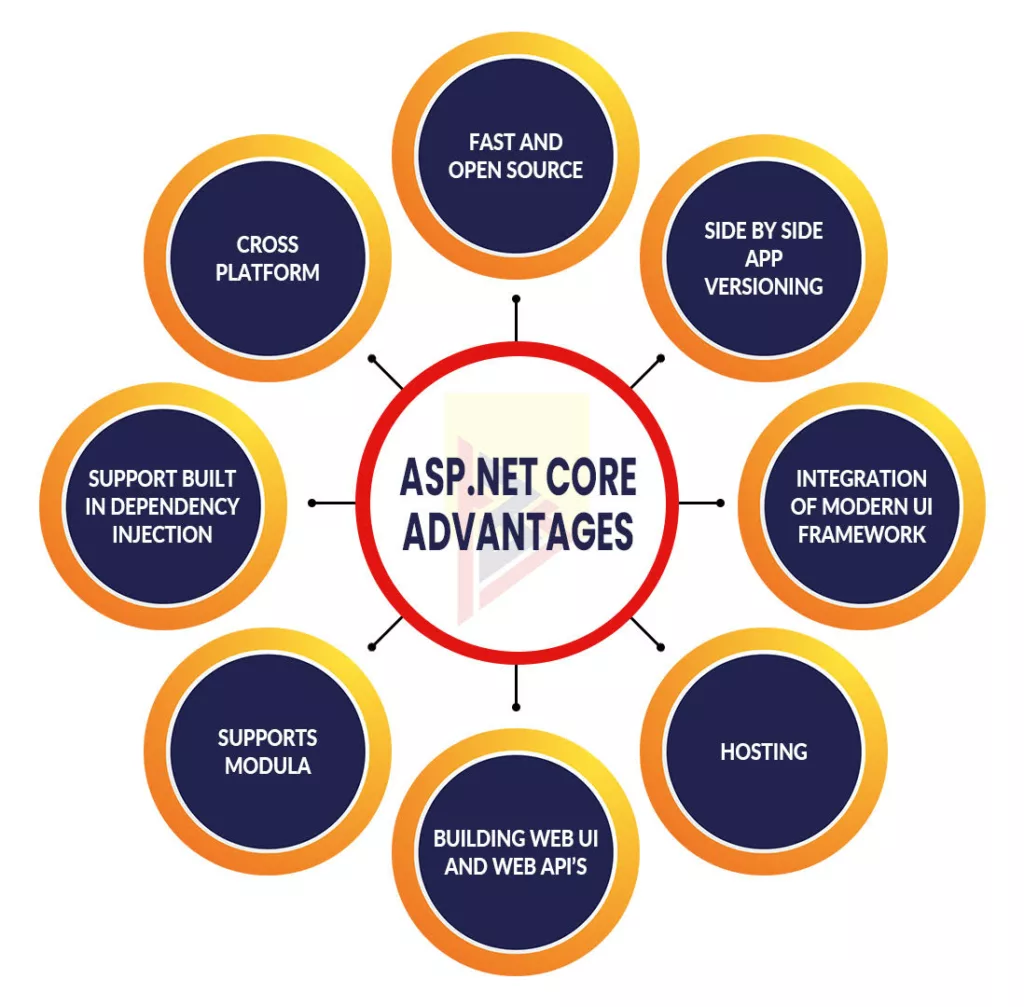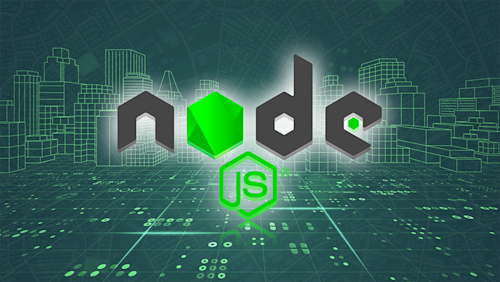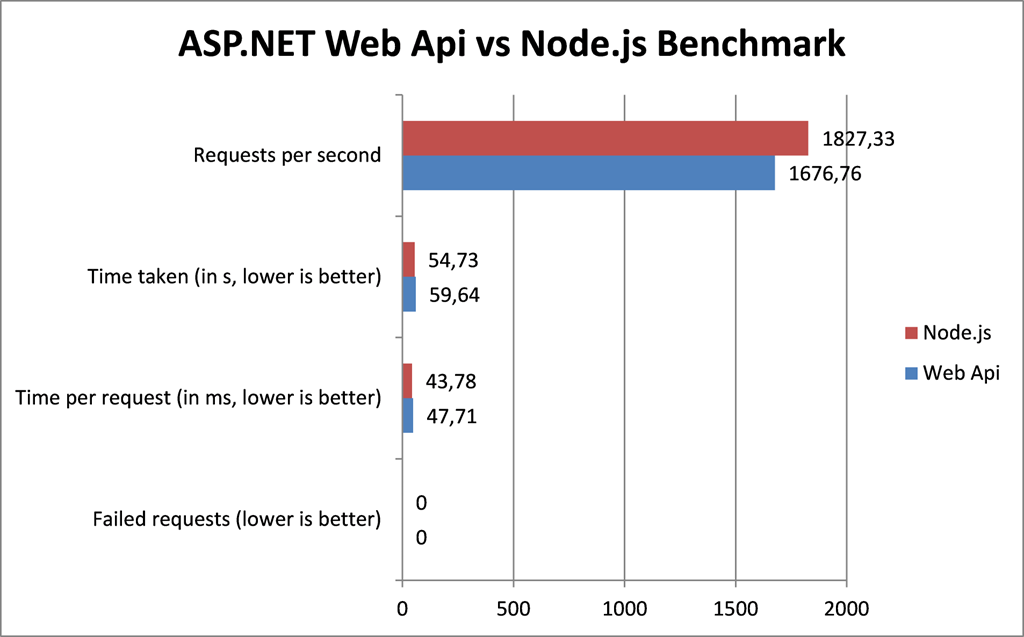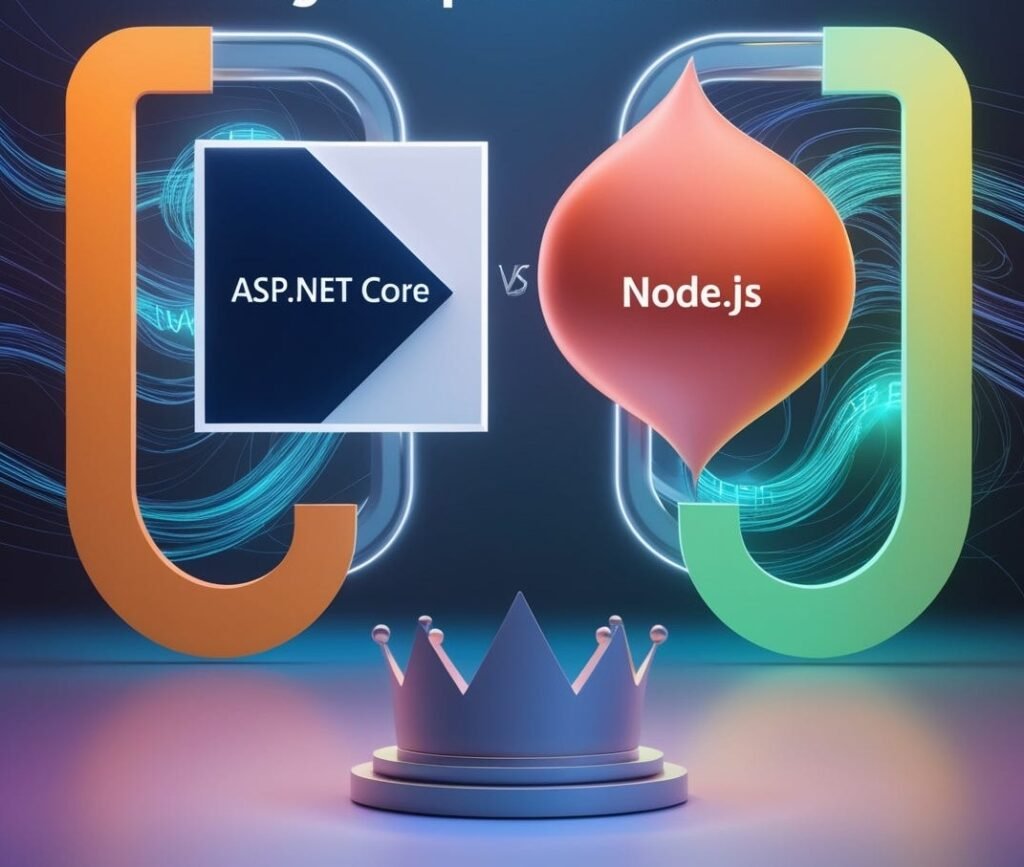
In 2025, choosing ASP.NET Core vs Node.js impacts your project’s success. Explore key differences to find the best backend for your next app
In the ever-evolving world of web development, choosing the right backend technology can make or break your project. In 2025, two leading contenders—ASP.NET Core and Node.js—continue to dominate developer discussions. ASP.NET Core, backed by Microsoft, is known for its performance, security, and enterprise-grade capabilities. Node.js, on the other hand, offers unmatched flexibility, scalability, and a thriving open-source ecosystem. This guide compares ASP.NET Core vs Node.js across performance, scalability, ease of development, and cost, helping developers choose the right tech stack for their 2025 projects.
1. Overview of ASP.NET Core

ASP.NET Core is Microsoft’s modern, open‑source framework optimized for cross‑platform development (Windows, Linux, macOS). Built in C#, it excels in structured enterprise applications, microservices, and cloud‑native architectures. Key features include built‑in dependency injection, Razor Pages, MVC, and seamless integration with Azure.
2. Overview of Node.js

Node.js is a JavaScript runtime powered by Chrome’s V8 engine. It enables server‑side JavaScript execution, ideal for real‑time, event‑driven applications. Its non‑blocking I/O architecture allows high concurrency and fast prototyping using JavaScript or TypeScript. With npm, it has one of the largest open-source ecosystems .
3. ASP.NET Core vs Node.js: Performance & Scalability

Performance of ASP.NET Core vs Node.js
• ASP.NET Core delivers exceptional performance in CPU‑intensive workloads due to its compiled nature and multithreaded design .
• Node.js is extremely efficient in handling large numbers of concurrent I/O operations, thanks to its event‑driven architecture.
Scalability
• ASP.NET Core offers scalable architecture with built‑in microservices support, and smooth vertical & horizontal scaling .
• Node.js scales horizontally via clustering and handles many simultaneous connections with ease, making it ideal for real‑time platforms .
4. ASP.NET Core vs Node.js Ecosystem, Tools & Developer Experience
Ecosystem & Libraries
• ASP.NET Core relies on NuGet, offering enterprise-strength libraries but fewer packages than npm.
• Node.js benefits from npm, which has millions of modules for just about every functionality needed .
Tooling & IDE
• ASP.NET Core shines with Visual Studio, offering rich debugging, IntelliSense, scaffolding, and architecture support .
• Node.js is commonly paired with VS Code or lightweight editors—fast to get started, especially for JavaScript developers .
Learning Curve of ASP.NET Core vs Node.js
• ASP.NET Core requires knowledge of C#, .NET patterns, and enterprise frameworks—steeper for beginners.
• Node.js is easier for frontend developers familiar with JavaScript, supporting rapid prototyping and full-stack development .
5. Use Cases of ASP.NET Core vs Node.js: When to Choose What
Choose ASP.NET Core if:
- You’re building enterprise-grade systems, ERP, financial, or healthcare applications.
- You require strong security, type safety, and long-term maintainability.
- You plan deep integration with Microsoft/Azure ecosystems.
Choose Node.js if:
- You need real-time capabilities (chat, live dashboards, collaboration tools).
- Your team prefers JavaScript/TypeScript, with lightweight and fast iteration cycles.
- You’re building APIs, microservices, or MVPs/startups with fast release velocity.
6. Security & Reliability ASP.NET Core vs Node.js
ASP.NET Core includes built-in security features—authentication, authorization, CSRF protection, and data validation—making regulatory compliance easier .
Node.js depends on external libraries like Helmet or rate‑limiters. Flexible but requires careful implementation and upkeep .
7. Community & Long-Term Viability
Both platforms are stable and reliable for enterprise and startup use, but they differ in backing and growth trajectories.
- ASP.NET Core benefits from Microsoft’s support, structured updates, and enterprise adoption .
- Node.js boasts a massive open‑source community and rapid innovation across industries like streaming, fintech, SaaS, and e-commerce .
8. Real-World Examples & Benchmarks

- Major platforms leveraging Node.js: Uber, Netflix, LinkedIn, PayPal, Twitter—all rely on it for handling high concurrency and real-time features.
- ASP.NET Core is widely adopted in enterprise environments where performance, security, and system integration matter most .
9. Cost & Talent Considerations
Both are open source, but your costs depend on developer availability, hosting, and project complexity.
- Node.js may allow faster, lower-cost launches due to JavaScript ubiquity and rapid coding.
- ASP.NET Core may require more specialized skills yet often delivers higher long‑term ROI in enterprise settings.
10. Choosing the Right Stack: A Decision Flow
- Are you building a real-time, chat, or streaming app? → Node.js.
- Is your project enterprise, performance-sensitive, or deeply integrated with Microsoft? → ASP.NET Core.
- Interested in full-stack JavaScript and fast MVP cycles? → Node.js.
- Prefer strongly typed C#, structured architecture, and Azure-first builds? → ASP.NET Core.
11. Tools for Migrating or Hybrid Stacks
Many projects use both—for frontend APIs in Node.js and backend services in ASP.NET Core. Adopting microservices or hybrid architectures allows you to leverage the strengths of both worlds. Interested? Check our Cloud Integration** guide** for seamless system orchestration.
12. Scalable Architecture & Future Trends
As your business grows, scalability and sustainability are vital. Leveraging scalable software solution architecture ensures your backend can evolve. Learn more about this in our article on Scalable Software Solutions.
Looking ahead to 2025, Node.js continues to dominate agile, cloud-first, developer-centric applications, while ASP.NET Core remains the top choice for enterprise-grade, compute-heavy, or mission-critical backend systems.
13. Final Recommendation
When evaluating ASP.NET Core vs Node.js, the best backend stack aligns with:
- Your technical requirements,
- Your team skillset, and
- Your project scope and long-term goals.
If you need speed, security, type safety, and tight Microsoft integration → go with ASP.NET Core.
If you value rapid development, real-time interactivity, and full-stack flexibility → Node.js is ideal.
14. Ready to Choose? We’re Here to Help
At Power Soft, we specialize in helping businesses pick the optimal tech stack and build robust, scalable systems. Need help deciding or migrating your backend? Contact us for a free consultation.
Summary Table: ASP.NET Core vs Node.js

| Criteria | ASP.NET Core | Node.js |
|---|---|---|
| Language | C#, F#, VB.NET | JavaScript, TypeScript |
| Performance | Excellent for CPU-bound tasks | Exceptional in I/O-heavy, concurrent apps |
| Ecosystem | NuGet, Microsoft tools | npm, vast open-source community |
| Scalability | Microservices, Azure alignment | Real-time, cluster-friendly scalability |
| Use Cases | Enterprise, financial, cloud-native | MVP, real-time apps, APIs |
| Security | Built-in enterprise-grade features | Depends on libraries |
| Developer Experience | Visual Studio, structured architecture | Fast prototyping, JS full-stack e |
💡 At Power Soft, we don’t believe in “one size fits all.”
Instead, we carefully align your business goals with the right tools and frameworks.
🌐 𝑾𝒉𝒂𝒕 𝑾𝒆 𝑶𝒇𝒇𝒆𝒓 𝒂𝒕 𝑷𝒐𝒘𝒆𝒓 𝑺𝒐𝒇𝒕
We build scalable, smart software solutions for growing businesses:
✅ Custom Web Applications (ASP.NET Core, Angular, Node.js, React)
✅ ERP, CRM & Business Automation
✅ Cloud Integration (Azure, AWS)
✅ Data Analytics Dashboards (Power BI, Tableau)
🎯 Whether you’re launching a SaaS platform, automating operations, or scaling your digital infrastructure — we’ve got the expertise and strategy to make it happen.
📖 Read the full blog now 👉 https://powersoft.agency
📞 Ready to start your next project? Let’s build something extraordinary together.
📧 Email: contact@powersoft.agency
🌐 Website: https://www.powersoft.agency/services
📞 Call & WhatsApp 1: +1 561-556-0226
📞 Call & WhatsApp 2: +88 01966 773464